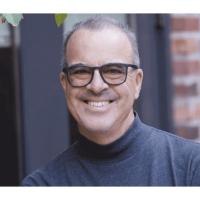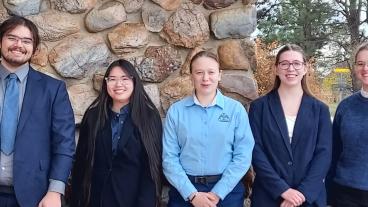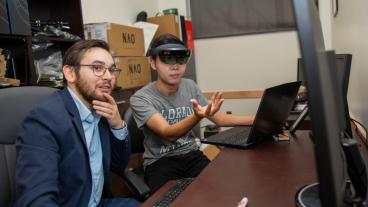
Angeline Letourneau, visiting professor in humanities, arts and social sciences, has received funding from the National Science Foundation and Lemelson Foundation to study how technical, social and environmental solutions can best intersect.
Today's biggest challenges, from environmental change and resource scarcity to the rapid advancement of technologies like AI, are complex and transcend traditional disciplinary boundaries.
Tackling these issues will require engineers who view their work as deeply intertwined with social values and environmental sustainability, said Angeline Letourneau, visiting assistant professor of humanities, arts & social sciences at Colorado School of Mines.
"Creating sustainable solutions for the future requires more than just technical brilliance," said Letourneau. "It requires engineers who understand that designing more efficient electricity grids, for example, involves understanding both the technology and the variability of renewable sources and community consumption patterns.”
Letourneau is leading a new initiative in partnership with the University of Colorado Boulder that aims to create that holistic “enviro-socio-technical" mindset in the next generation of engineers.
With funding from the National Science Foundation’s Division of Engineering Education & Centers and The Lemelson Foundation, Letourneau and her collaborators at Mines and CU Boulder seek to bridge a gap in current engineering curricula by integrating technical knowledge with societal and environmental considerations.
The project will develop and test novel teaching methods, specifically short, adaptable "micro-interventions," that use real-world case studies—like the technical, social, and environmental issues surrounding the Salton Sea—to illustrate this integrated, systems-thinking approach. These modules will be integrated across diverse engineering and humanities courses at both Mines and CU Boulder.
The effectiveness of these new pedagogical strategies will be assessed through a multi-stage survey methodology and semi-structured interviews with approximately 500 students annually, providing deep, qualitative insights into their learning experiences.
Over 1,000 engineering students at Mines and CU Boulder will be directly impacted by this effort. The project will also establish a multi-disciplinary collaborative faculty group to nurture shared learning and broadly distribute effective practices for integrating the Lemelson Foundation’s Engineering for One Planet framework. The EOP initiative is a movement launched in 2020 to transform engineering education by embedding sustainability across all engineering disciplines.
Co-principal investigators working with Letourneau on the project include Jon Leydons, professor of humanities, arts and social sciences (HASS), and Adrianne Kroepsch, associate professor in HASS. Senior personnel on the effort include Katie Johnson, professor of electrical engineering; Paula Farca, teaching professor in HASS; and Shannon Mancus, teaching professor in HASS.




